What can you do to reduce menopausal symptoms? How long will the transition take?
Most known symptoms of menopause in women
A lot changes for women during the menopause. Menopause is also not a sexy topic at all. You wish you were still young and completely vital. However, in the meantime you are struggling with things such as:
Physical menopausal complaints
Mental menopausal complaints
- Palpitations
- Weight gain
- Vaginal complaints
- Hot flushes
- Fluid retention, bloating
- Joint pain. Estrogen plays a role in controlling inflammation levels throughout the body, so without it, women are more at risk of developing joint pain
- Migraine and frequent headaches: Reduced blood flow, lack of sleep, anxiety and other problems can contribute to frequent headaches
- Stomach / intestinal complaints
(often constipation or IBS) - Hair thinning
- Dry skin: many women notice that their skin is starting to show signs of aging, such as wrinkles, dark spots, dryness, less elasticity and sometimes more itching
- Changes in the breast tissue: the breasts may become smaller, have more fat tissue and lose some of their volume
- Hopelessness
- Worrying
- Irritability
- Worse concentration: Estrogen and testosterone play a role in memory, motivation and mood
- Appetite change, binge eating
- Insomnia
- Fatigue, lack of energy
- Crying spells
- Depressed feelings and sometimes anxiety
- Loneliness, withdrawal
- Feeling of losing control
- Menopause fatigue
Least known symptoms in menopausal women
- Burning tongue
- Tooth pain or dry mouth
- Feeling of electric shock. This is not yet fully understood, but it is thought that it may be due to hormonal imbalances that affect how the brain interprets and sends messages to the nervous system.

What is the menopause in women?
Menopause has also been called perimenopause in English. A woman's reproductive life is split into three major time periods:
1. The years of active reproduction / fertility
2. The menopausal years (including menopause)
3. And the years after menopause
In fact, the process that most people call 'menopause' can be divided into three parts: perimenopause, menopause and postmenopause.
Menopause is defined as the time period beginning 12 months after a woman's last menstrual cycle / menstrual period.
How long does the transition take? When does menopause start in women
As with menopause itself, this varies from woman to woman.
Every woman eventually goes into menopause. You can do that quite early, around the age of 40e, but also after you turn 55e. However, some women are now beginning menopause earlier because of certain past medical problems. Hormone changes in your body and that can cause all kinds of complaints.
From transition to menopause. How long will the transition take?
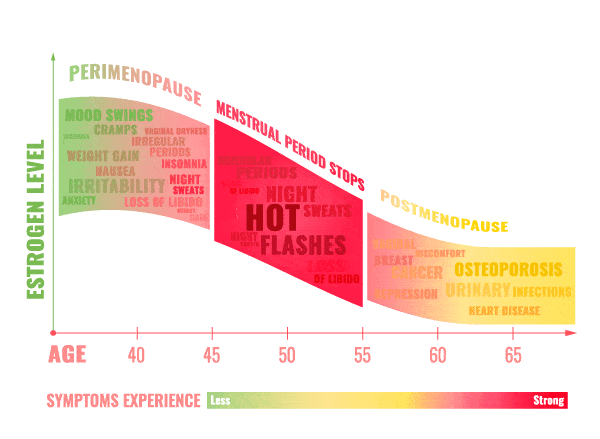
During each of the major reproductive stages of a woman's life outlined above, different hormonal glands in her body work together to determine how much of each hormone is produced. Glands including the pituitary gland, ovaries, and thyroid all play a role in the transition to menopause.
Even other organs/tissues such as the uterus, breast tissue and fat cells (fatty tissue) are capable of secreting hormones that affect reproduction.
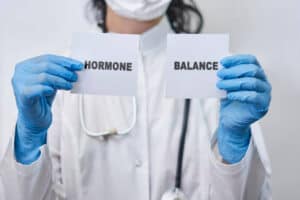
Hormonal changes: estrogen, progesterone, testosterone
menopausal symptoms test
The main hormonal changes involved in perimenopause are menopause and postmenopause estrogen, progesterone and testosterone. While other hormones usually shift and are involved (including serotonin and insulin), these three have the greatest impact on a woman's reproductive capacity - estrogen especially
- Estrogen is the collective name for three types of female hormones (estoril, estradiol and estrone) that are usually secreted by the ovaries. The three types of estrogen are primarily responsible for imparting feminine qualities to women (and to some extent men, too), including her reproductive capacity, fat around her hips / thighs, and her smooth skin.
- Progesterone is the hormone that prepares the uterus for pregnancy among other jobs
- Testosterone is the hormone most commonly associated with masculine traits.
When the ovaries stop making a high percentage of your body's estrogen (they are responsible for 90 percent of pre-menopausal production), you enter menopause.
Because estrogen has important effects on body weight and composition, mood, sleep, sex drive, cognitive function, memory, and blood flow, many different symptoms can occur during perimenopause / menopause due to falling estrogen levels.
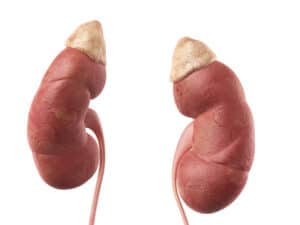
Adrenal glands are the back-up organs during the menopause in women
Ovaries and adrenal glands
As a woman enters menopause, her hormone production in ovaries decreases markedly and so it is the role of the adrenal glands to take over some of the roles of the failing ovaries. These are the size of a walnut and sit on top of our kidneys.
During this phase of life, the adrenal glands produce a hormone called androstenedione, which can attach itself to the most powerful estrogen via conversion into adipose tissue.
Androstenedione is also converted into testosterone and in turn testosterone can undergo a process called aromatization. It plays a role in converting estrogen into another form known as estradiol.

The main role of our adrenal glands is to produce hormones.
Menopausal symptoms test
Adrenal glands produce hormones that are important in the transition and menopause phases:
- DHEA is a steroid hormone produced by the adrenal glands and aids in the secondary production of estrogen, progesterone and testosterone - also called sex hormones.
- Our fight or flight response is determined by our adrenal glands, by the production of adrenaline and cortisol.
The adrenal glands are of great importance in every woman's menopause. Start nurturing your adrenal glands long before the menopause.
In practice I often see that women with adrenal exhaustion often suffer from menopausal complaints.
Here you can read more about adrenal fatigue and how you can support them.
In the laboratory of RP Analytics we can perform a test for menopausal complaints, via saliva.
What is being tested:
- DHEA
- Testosterone
- Estrogen
- Progesterone
- Cortisol
An example from my practice. A menopausal symptoms test.
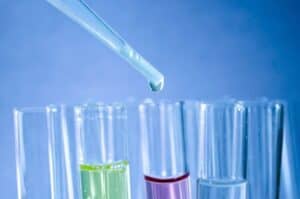
A woman in her mid fifties came to my practice with headaches and fatigue. After the saliva test it turned out that she had too little cortisol production and little estrogen.
She has been given a treatment plan with nutrition and nutritional supplements to support her adrenal glands.
After a month she said that she no longer has headaches and more energy than before.
Sometimes there are simple adjustments in food and nutritional supplements to have a good effect to reduce menopause complaints.
Do you have any questions? contact with me for a personal advice

Can you still get pregnant during perimenopause?
Technically you can. Although the menstrual cycle is irregular and fertility is low at this point in a woman's life, it is not impossible to conceive until menopause begins.
What can you do to reduce menopausal symptoms?
I. Adrenals. Provide healthy adrenal glands (read here how to restore adrenal glands). Take enough rest, walk, get enough sleep and proper nutritional supplements such as Vitamin C with bioflavonoids, vitamin B5 or licorice.
II. Fluctuating sugar levels. One of the main causes of menopausal problems is an excessively fluctuating sugar level. An elevated glucose level after having consumed a lot of sugars causes an insulin peak that causes all glucose to disappear from the blood very quickly. The result is a lowered glucose level or hypoglycemia. After a few hours without eating, do you experience aggressive feelings, feeling cranky, tired or sleepy? Then you have a lowered glucose level.
There is often a great urge for sweet food - with which the body indicates that it needs energy. But eating carbohydrates is not the solution.
The best diet at this stage is a keto or diet low-carbohydrate food.
III. Hormonal balance with fats. All hormones need a basic substance - fat. So healthy fats are of great importance for the production of hormones. Think unsalted nuts / seeds, oils, avocado and fatty fish.
IV. Healthy intestines and better mood. Serotonin, our “happy hormone” 80% is produced in our gut. So healthy intestines are not unbreakable in reducing menopausal symptoms. Do you have a healthy gut? do the quiz.
Reduce menopausal symptoms with nutritional supplements

Reduce menopausal symptoms with herbs
- Black cohosh, Cimicifuga racemosa in Latin. Preparations of this black root and rhizome are used for women's complaints such as menstrual pain and menopausal complaints such as hot flashes, night sweats, heart palpitations, anxiety and mood swings. Black cohosh contains no phytoestrogens as previously thought.
- Red clover contains phytoestrogens that help regulate your hormone metabolism. You can make very tasty tea that tastes like black tea or use supplements
- Ashwagandha. an Ayurverdic herb that is used for PMS complaints, anxiety, insomnia, headaches, mood swings, concentration problems and fatigue
- Rhodioloa (Rholiola rosea) is also known as golden root. It is popular in recent studies for its powerful adaptogenic effects. This powerful herb helps the body fight the negative effects of stress.
- Maca, also known as 'Peruvian ginseng', has no relationship to ginseng. Found in Peru and enjoyed for thousands of years for its beneficial properties. This root increases strength, energy, stamina, libido and sexual function. It improves perimenopause and menopausal symptoms such as hot flashes, night sweats, anxiety and depression.
8 tips to reduce menopausal symptoms
- Eat balanced meals, avoid carbohydrates and processed or even spicy foods. Think of healthy fats such as avocado, oils, nuts/seeds, fish oil for hormonal balance.
- Avoid extreme exerciseWhile daily exercise can help relieve menopausal symptoms, for many menopausal women, a light workout from a low-impact routine such as swimming, walking, or light muscle exercises is more than enough. Vigorous exercise can raise your core temperature and cause more hot flashes
- Decaffeinated. Switch to decaffeinated, cold drinks such as flavored water, chilled herbal tea, or pure water to keep your body temperature low and side effects to a minimum.
- Stress free. Keep life as stress-free as possible. Think of meditations, doing yoga, listening to music or having a nap.
- Wear light comfortable clothing with layers.
- Not a hot bath. As relaxing as that can be, hot showers or baths can be particularly difficult just before going to bed.
- Alcohol consumption: Since that is, women who drink alcohol (especially in larger amounts) are more likely to suffer from hot flashes than those who limit themselves to one drink a day - or none.
- Weight management. Fat cells influence estrogen levels. Try to control weight. It is difficult during menopause and menopause, but don't give up. It is possible! Work with an expert.

Does every woman have menopausal complaints?
Not every woman has menopausal complaints… lucky them :).
Statistically, 80% of menopausal women suffer from menopausal symptoms. I know some women who did not know that they were already in menopause, so no menopausal symptoms at all and no menopause symptoms are possible 🙂
A holistic approach to reduce menopausal symptoms.
In my practice I work holistically. Holistic healing involves the whole individual and not different parts of the body.
Laboratory tests, a test for menopausal complaints, energetic examinations and extensive questionnaires are indispensable in holistic therapy.
- Do you have healthy intestines? Quiz
- Low-carbohydrate eating and experiences
- Ovarian adrenal interactions
- Leaky gut symptoms
- Irritable Bowel Syndrome (IBS)
- Menopausal symptoms test
- How long does the transition take
menopausal fatigue
menopausal symptoms test
when does menopause start in women




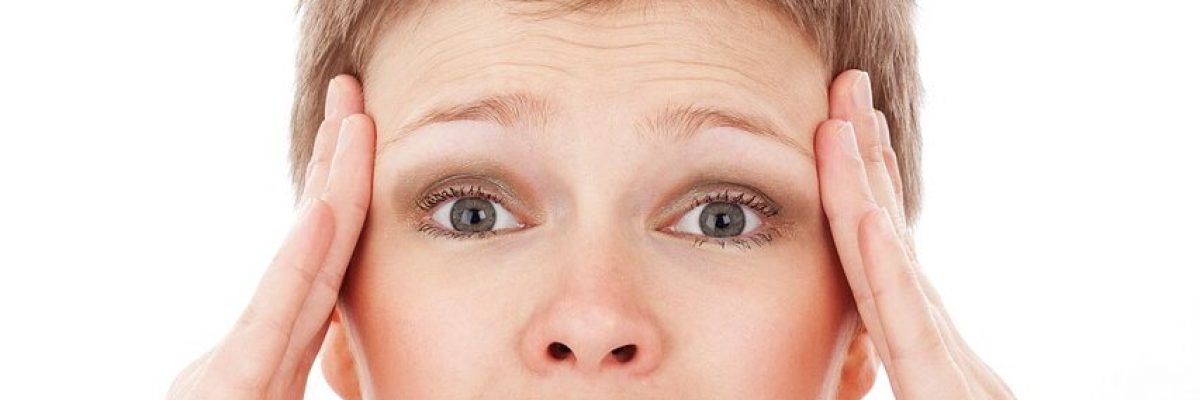




2 thoughts on “Overgangsklachten verminderen”
Hi Elena, where is the best place to start to find out what's going on? Have a test done?
It is best to discuss which complaints there are. You can achieve a lot with food and nutritional supplements.
If it doesn't work we can always have a test done.